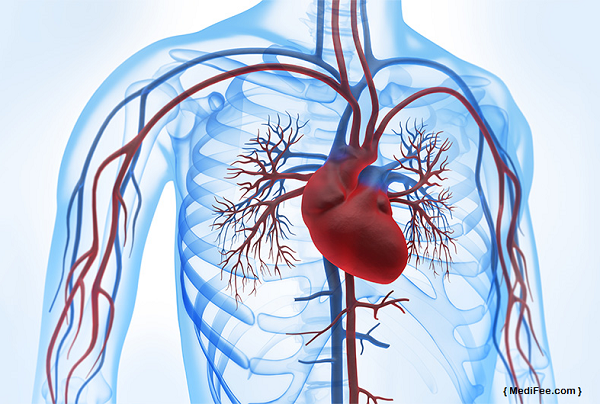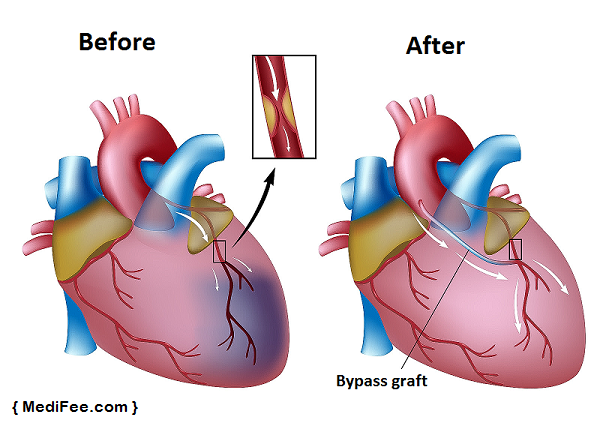Bypass surgery, also known as Coronary Artery Bypass Graft (CABG) Surgery is a procedure done to find an alternative path, that can compensate for damaged arteries which fail to carry oxygen rich blood to the heart. The alternative path is created by blood vessels taken from another part of your body. Since these blood vessels form a bypass around the original channel of blood flow, the procedure is known as heart bypass surgery.
Now, for anybody to know, that they themselves or someone they love needs to undergo a bypass surgery, could be certainly a terrifying experience, they wish to escape. However, if anybody has been ordered this surgical remedy, opting for it without delay is the best they can do to avoid consequences.
Bypass surgeries are definitely major surgical procedures that need a good amount of preparation before hand. In addition, there are a multitude of questions that haunt individuals scheduled for this surgery. “Is it risky to undergo a bypass surgery?” “Are there no other alternative methods for treating the ailment?” “How does it feel to undergo this surgery?” “How long does it take to recover from a CABG surgery?” This can go endlessly, leading to increased anxiety, confusion and overall degradation of your health status.
Thus, the only resolute to a scenario such as this, could be learning more and more about the procedure, and what you as a patient or a care taker can do, to yield best results and quick recovery.
Is bypass the only remedy?
This depends on the amount of blockage within your arteries. And if your doctor has ordered this remedy, then perhaps your arteries are sufficiently clogged and may lead to blood clots, causing potentially fatal heart attacks.
Blockage is the result of prolonged deposition of plaque that hinders normal blood flow to the heart. Plaques are nothing but wax like substances, that build around heart blood vessels leading to coronary artery diseases.
Clogging hinders normal blood flow, leading to formation of blood clots. In severe and worst cases, these blood clots can cut off the blood supply channels completely; leading to sudden heart attack and death. Procedures such as angioplasty or stenting could serve as a remedy in situations where clotting chances are comparatively lesser. However, if your doctor detects sufficient clogging that can form blood clots immediately, bypass surgery needs to be opted for.
What are the factors that make bypass surgery the only option?
As already discussed, excessive clogging calls for an immediate bypass surgery. However, there are still other aspects where bypass can only serve the purpose. Some of them have been explained in the following section.
- Individuals who have more than one blocked arteries, will find CABG more beneficial than other procedures
- For individuals who have a damaged left ventricle, bypass becomes inescapable. Left ventricle serves as the core pumping zone. So, if this gets dysfunctional, major surgeries such as this must be opted for.
- In cases where arteries connecting to the left ventricle get damaged, bypass surgeries serve best outcomes
- For individuals who have had angioplasty and stent treatments in the past, bypass becomes the last resolute for any further blockage issues
How will you prepare for a heart bypass surgery?
Heart bypass surgeries require a number of prior preparations that together govern the success rate of your surgery. Prior to surgery, individuals are required to undergo a number of diagnostic tests, that together give an overall idea about your heart condition.
Testing to know overall health condition:
Some of the mandatory lab examinations needed before the surgery are: General Chest X Ray, Electrocardiogram, angiography and perhaps a blood test.
People already suffering from other health disorders such as diabetes, obesity and breathing troubles, need to inform surgeons about the same before hand. Testing for blood sugar prior to surgery is mandatory for all diabetics. Also, having close to normal blood pressure levels and keeping your body weight under control is also recommended by surgeons.
Discontinuation of medicines:
Patients need to make a list of all medicines and supplements they consume and then discuss the same with their doctors. There are some medicines, such as pain relievers, prescribed drugs to relieve clotting, blood thinners, or health supplements that may or may not affect the surgery procedure. Therefore, prior discussion with your surgeon and doing whatever suggested is essential.
Abstaining from smoking or alcohol:
No matter which surgery you are preparing for, bad habits of smoking and alcohol consumption need to be avoided. These always have a detrimental effect on your health and hence, completely refraining from them is advocated.
Patients need to fast before the surgery:
Individuals scheduled for the surgery need to fast since the midnight before the day of their surgery. Besides, cleaning yourself carefully on the day of your surgery is suggested. Many doctors also suggest medicated soaps to be used for reduceing chances of infection to negligible levels.
What happens on the day of your bypass surgery?
Heart bypass surgeries are lengthy procedures consuming long hours; during which, patients remain in an unconscious state. The following section will help you get a tentative idea about what happens on the day of your surgery.
Administering anesthesia:
As soon as you reach the hospital on the day of your surgery, you will be first given an IV line through which anesthesia will be introduced in the body. Immediately after the anesthesiologist is done administering the correct dose of medicine, you will feel a little dizzy and within no time you will fall into deep sleep.
Cutting through the ribcage, reaching the heart:
Once you have been sufficiently sedated, your doctor will make an incision on your ribcage leading to heart. The type of incision depends on the procedure adopted. Mostly, modern surgeons are using minimally invasive techniques.
An artificial pump that temporarily replaces your heart:
Most patients require to be connected to an artificial pumping machine that circulates oxygen rich blood throughout the body. This is because, as the heart is being operated, it needs to be made dysfunctional for the time being. Therefore, having an artificial machine making up for that crucial time is critical. There are a few cases where artificial pumping may not be required. Your surgeon will be the best person to decide on this factor.
Replacing damaged artery with a graft:
The surgeon then uses complex procedures to detect one or more damaged arteries. You may very well expect your doctor to conduct an angiography at this stage. Once the artery is located, your doctor may take a blood vessel from your chest wall or legs and then replace it with the damaged one detected. This healthy blood vessel is known as the graft and hence the name Coronary Artery Bypass Surgery.
Disconnecting the artificial heart pump:
Once the graft has been successfully connected, the heart pump is carefully disconnected by the surgeon. Now, the doctor studies general functioning of your heart with the new artery. If everything appears to have gone fine, your doctor will prepare for final stitching.
Hospital stay for around 7 days:
Post surgery, patients find themselves in Intensive Care Unit. As these are complex surgeries, spending a few days in the hospital under observation is crucial. Very healthy patients may need to spend a day or two in ICU; while others may need to spend more than a week.
When your doctor finds you to be sufficiently stable, you may be shifted from the ICU to another private ward section. Having spend two to three days there, you can gear up to leave for your home.
Recovering from Heart Bypass Surgery:
Recovering from bypass surgeries requires around 7 – 12 weeks. This begins immediately from your first day at home after spending few days in the hospital.
After you reach home:
- Completely abstaining from any form of physical exertion is the first piece of advice you get from your surgeon
- Take care of your incisions. During your stay in the hospital, care givers had taken sufficient care of the incisions made during the surgery. Now, it is you who needs to continue with the same procedures. You will definitely have received suggestions regarding wound care and certain ointment; make sure to administer it efficiently.
- Slowly start lifting objects; however, never pressurize yourself as this can prove otherwise. Some doctors suggest stress tests and cardiac rehabilitation to monitor patients who are recovering from these surgeries.
- Dietary modifications as suggested by your doctor are mandatory to prevent future complications
- Any form of discomfort, such as trouble breathing, chest pain, skin rash, fever or flu like symptoms needs to be reported immediately to your doctor
- Never miss your follow up appointments as these are important for the doctor to know how well the body is responding to the surgical treatment. Besides, medicine dosages also need constant monitoring that is possible only on follow up appointments.
What is triple bypass surgery?
Bypass surgeries that are performed to treat three blocked arteries and therefore require three grafts are known as triple bypass surgeries.
Similarly, if the same procedure is performed on four or five damaged arteries, the patient is said to undergo Quadruple or Quintuple bypass surgeries. These are extensively severe conditions and mostly performed under emergency situations.
What are the associated risk factors of Heart Bypass Surgery?
Every operation comes with advantages and a few risks as well. Coronary Bypass also has some associated risks, which are mostly higher when the operation is carried out as an emergency solution. People who have scheduled surgery do not remain at high risk zones. However still, patients may experience few of the complications that are mostly temporary.
Irregular pulses, severe infection within incisions, excessive bleeding, are the most common problems experienced post surgery. However, medication and required treatment eliminates these issues within a day or two.
Many people experience loss of memory and difficulty in thinking clearly. Administering relevant medication improves this within 3 – 4 weeks post surgery. Sudden heart attack after the surgery is the rarest thing that can happen and usually relates to a blood clot that bursts post surgery. This happens when a person has severe blockages and several clots.
This was all about bypass surgeries and how you can prepare. Well, taking care of your vital organ such as heart needs to be one of your prime responsibilities. Not letting our heart to reach such stages where surgeries become the ultimate resolve is the best thing we could all do. However, if we have been leading a careless life and have reached this stage where doctors prescribe surgeries, opting for the same without delay is what can add a few more years to our lives. Thus, if you are scheduled for a surgery, be brave and go for it. Moreover, now that you have learned about every aspect of these operations, opting for one should not be very difficult.






